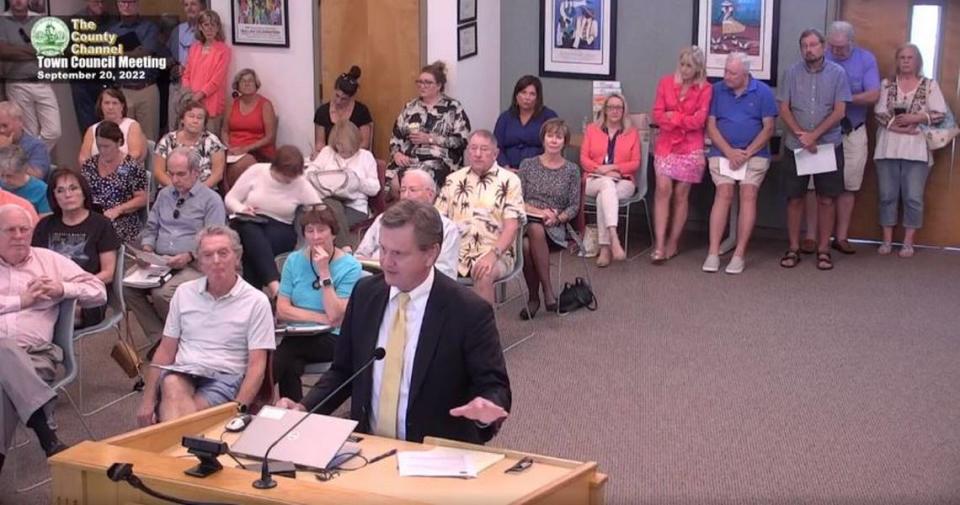A divided Hilton Head council narrowly reaches 278 bridge pact with Beaufort County
After months of negotiation, the Hilton Head Town Council and Beaufort County have found common ground to proceed with the U.S. 278 corridor project.
Although the county’s “memorandum of understanding” was passed Tuesday evening, the 4-3 vote reflected a sharply divided room. The staunch criticism members of the public levied against the agreement betrayed the results of the final vote. But some council members felt it best to move forward now rather than risk losing significant state funding.
The agreement paves the way for an environmental assessment from federal and state agencies to take place. It also states the project will move forward with the proposed single-bridge design and a committee will be formed of town and county employees to select an independent review firm for an end-to-end study.
Mayor John McCann, Ward 5 Councilman Tom Lennox, Ward 6 Councilman Glenn Stanford and Ward 2 Councilman Bill Harkins voted in favor of the MOU.
Lennox and Stanford each provided their reasoning, which centered on funding for the project. State Sen. Tom Davis (R-Beaufort) attended the meeting and explained that the project’s current cost is set around $328 million. That estimation includes a 20% hedge for inflation, supply issues and other cost overruns, he said.
In discussions with state leaders, Davis said he was told if the current project continued to experience delays, it could jeopardize $120 million in funds promised by the South Carolina Transportation Infrastructure Bank.

Davis emphasized the project wasn’t certain to lose funding if negotiations on the MOU continued, and the money could potentially be re-acquired later, but Lennox said he was not willing to put the $120 million at risk.
“I think (regaining funding from the state if lost) is a big if,” Lennox said. “The risk of losing that $120 million and killing this project, I think forever, is unacceptable.”
Another selling point of the current MOU for Stanford was the fact it allows an independent end-to-end study to begin, pending the selection of a firm to carry out the review.
“This agreement puts the independent review in place so that we will know, in a matter of six to nine months, about the details of this project,” Stanford said. “I’m not voting in favor of this project (as a whole) now, I’m voting in favor of having the independent review.”

A ‘backroom’ project
For the council’s three dissenters, the most glaring omission from the county’s MOU was citizen representation.
Ward 4 Councilwoman Tamara Becker, who voted no on accepting the MOU, was a vocal supporter of having citizens be part of a committee. The committee will select a partner to conduct an independent end-to-end study of the current project’s impact on surrounding communities and nature, and provide potential alternatives where needed.
With the MOU passed Tuesday, the committee will consist of three members selected by the Town of Hilton Head, and three from Beaufort County. Originally, the county proposed a committee of three employees of its own and two from the town.
“We are once again giving up that responsibility to our residents and our citizens of Hilton Head to six unelected — some who don’t even live on Hilton Head — staff members,” Becker said during debate on the MOU. “It is absolutely imperative that we include citizens, and perhaps even a council member or two.”

Ward 1 Councilman Alex Brown joined Becker in voting no. Brown criticized the transparency of the project overall, adding that the town would not have been included in the ongoing NEPA process — the federal process that informs agencies about the potential environmental impacts of construction projects — without information given to them by Davis.
“I think that’s been a huge flaw in this whole process,” Brown said. “And let’s face it: the whole idea of not only replacing the deficient bridge, but to replace everything, was an idea that was cooked up in a backroom. That was not a public effort.”
The current proposal also harms the character of Hilton Head Island, said Ward 3 Councilman David Ames, who cast the final no vote.
“The blunt-force scale of the (proposed six-lane) bridge and roadway overwhelms the island and is in conflict with the island’s brand of being environmentally sensitive and nature-blending,” Ames said.
What’s next?
While the MOU was passed, the agreement does not signify Hilton Head’s municipal consent for the project.
“If the town doesn’t give its municipal consent, at the end of the day, this project’s done,” Davis said, recounting what he was told by state Secretary of Transportation Christy Hall. “(SCDOT) is not going to go forward with the project in the absence of municipal consent.”
Becker criticized other council members for “acquiescing” to the county’s wishes, despite there never being a formal withdrawal of the town’s original request for a two split bridges instead of one six-lane construction.
Several members of the public said with the town agreeing to the MOU absent of citizen oversight on the review firm selection committee, their confidence in the process is shaken.
“I asked earlier in my public comments, ‘are you listening,’” said Hilton Head Island resident Richard Busy. “And quite frankly, I think the answer is a resounding ‘no’ ... other than Councilwoman Becker who talked about the need for citizen involvement, I’m hearing nothing from the council on that issue.”
Other members of the public, including former mayoral candidate Tom Cleary, who recently withdrew from the race, said it would be wiser to wait for the local elections before taking action on the U.S. 278 project. The election is in 35 days on Nov. 8.
None of the councilmen who cast yes votes are currently seeking reelection.

 Yahoo Movies
Yahoo Movies 
